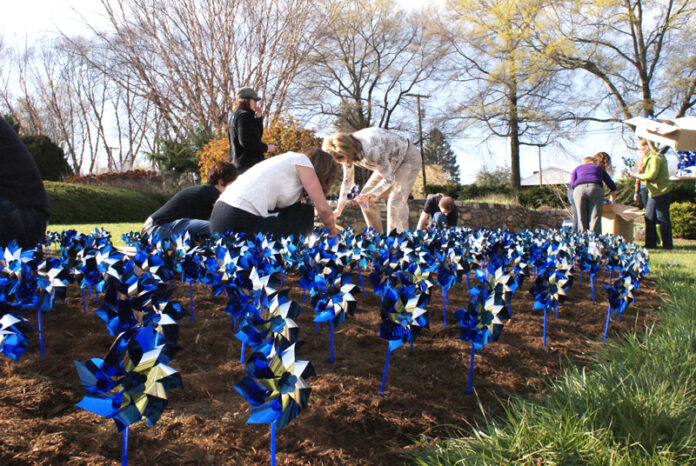
by Gene Marrano
April is Child Abuse Prevention Month, a point that Children’s Trust Roanoke Valley aims to drive home with a “garden” of 500 pinwheels that were planted in a plot at Virginia Western Community College’s arboretum on Monday. This is the second year that the pinwheel display was planted at the school.
Many people may not think that child abuse and neglect is a major problem in the Roanoke Valley, but from July 2009 to June 2010 the Roanoke City and Roanoke County departments of social services (each locality has its own agency) reported that they received more than 2000 reports to the contrary.
More than 300 merited a special investigation, according to Children’s Trust Roanoke Valley executive director Janice Dinkins-Davidson. She is not sure how many children wind up being taken away from their parents, but said the real goal in any case “is to keep the families together if at all possible – at least some portion of the family.” Parenting classes or counseling, providing for basic needs like food and clothing can often make a difference.
The Children’s Trust role is intervention and child advocacy, often working with local social service and law enforcement agencies. Part of that role for the Trust, which is located in the Jefferson Center, is providing a “child friendly environment,” where interviews and investigations can take place. Children’s Trust Roanoke Valley merged with CASA (Court Appointed Special Advocates) several years ago; that part of the agency helps place children when necessary in another home.
Among those planting pinwheels were students from a Masters in Social Work program at Radford University. “We chose child abuse [as a school project],” said Sammi Rader, who saw the pinwheel plot as a way “to help create awareness in our community, to get the word out there about child abuse.” Oak Grove Elementary School principal Chris Flippen also lent a hand. “It’s gorgeous,” she said, as the silver and blue pinwheels shimmered in the morning sun.
Dinkins-Davidson came to the Trust almost a decade ago after a long career in non-profit work elsewhere. “I’m happy to be doing it… I’m really interested in the forward movement of child protection in our country.” She said that in general social service agencies nationwide are doing a better job of recognizing child abuse, and a better job in preventing it initially. Raising the awareness level about child abuse in the community is a major factor – and that’s where the pinwheels came in. “Communities have become much more interested in the issue, and are more willing to talk about it.”
The data is still new but Dinkins-Davidson said there is a “direct correlation,” between the poor economy and an uptick in reports of child abuse, as families deal with tightening budgets and more stress. “Particularly for families that are on the edge and already at risk.”
“If you can prevent child abuse you don’t wind up with a child victim,” said Dinkins-Davidson. She noted that the pinwheel, a child’s toy, is recognized nationally as the symbol of child abuse prevention. They were also planted said Dinkins-Davidson, “to celebrate the happy and healthy children in our community, because we do have a community that’s very pro-child.”
The Virginia Western plot is plainly visible to drivers passing by on Colonial Avenue, a gentle reminder (along with an accompanying banner) that April is Child Abuse Prevention Month.

